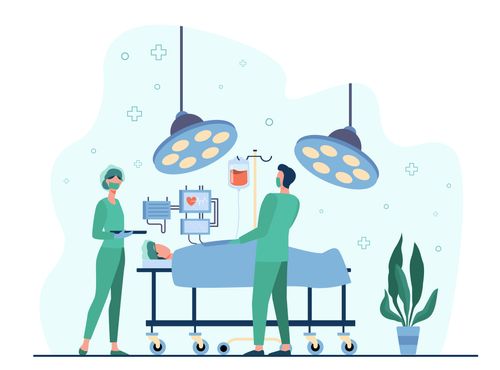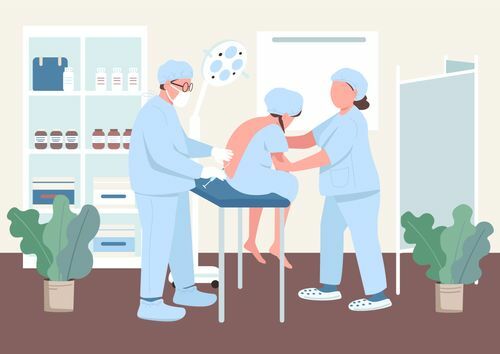Table of Contents
- Skills you need to become an anesthesiologist
- Eligibility criteria for an anesthesia course
- Specializations offered in an anesthesia course
- Top universities abroad for an anesthesia course
- Top universities in India for studying anesthesiology
- Syllabus and course description for a BSc. in anesthesiology
- Career prospects
- Job opportunities
- Key takeaways
- FAQs
Anesthesiology is the medical name for the practice of anesthesia. It allows doctors and surgeons to execute medical procedures with great accuracy and speed by injecting or making the patient inhale particular medications that cause a loss of awareness and feeling. To become an anesthesiologist, you will need to pursue an anesthesia course. Keep reading to know the skills, eligibility criteria, and top universities to apply to for a career in anesthesiology.
Anesthesiologists are required to be knowledgeable in physiology, pharmacology, and other pertinent details to assist with highly sophisticated procedures involving the body’s key organs.
Skills you need to become an anesthesiologist
In addition to fundamental knowledge of both medicine and surgery, anesthesiology requires expertise in the following-
- Existing respiratory, circulatory, and gastrointestinal systems and how to control, maneuver or go around or through them
- Reanimation techniques for organ failure or collapse
- Analyzing hemodynamic monitor data
Eligibility criteria for an anesthesia course

The eligibility for pursuing an anesthesia course is as follows –
- Passing 10+2 with physics, chemistry, and biology as subjects from an accredited board with a minimum of 50% and above.
- Those who wish to pursue a PG diploma course in anesthesia must have an undergraduate degree in MBBS/Pharma with a minimum of 50% marks.
For admission to different universities and institutes, national-level exams are also held, such as the State University Entrance Test and the NEET-PG. In addition, several institutions have their own entrance exams, such as the JIPMER and CMC tests.
Specializations offered in an anesthesia course
You can specialize in a variety of subfields, depending on the structure of your anesthesia course. However, you might need to complete extra training and get some years of patient care experience before you decide on a particular specialization.
Below are a few concentrations that are available in an anesthesia course-
- Intensive Care Anaesthesia
- Anesthesia for the chest wall
- Pediatric Anaesthesia Neurosurgical Anaesthesia
- Palliative care and anesthesia
- Anesthesia for orthopedics
- Pregnancy anesthesia
Top universities abroad for an anesthesia course
Here is a list of some of the best world-class universities from around the world for aspirants to pursue a BSc anesthesia course-
- University of Nottingham
- The University of Adelaide
- University of New South Wales
- University of Notre Dame
- National University of Ireland
- University of Buckingham
- University of St Andrews
- Bangor University
- TAFE Queensland
- Cardiff University
Top universities in India for studying anesthesiology
Here is a list of some of the top colleges for anesthesiology in India-
- All India Institute of Medical Sciences
- Aligarh Muslim University
- Mahatma Gandhi Mission Institute of Health Sciences
- Indira Gandhi Medical College
- Armed Forces Medical College
- Government Medical College and Hospital
- KS Hegde Medical Academy
- Sri Venkateswara Institute of Medical Sciences
Syllabus and course description for a BSc. in anesthesiology
| First year | Second Year | Third Year |
| Human Anatomy | Medicine relevant to Anaesthesia Technology | Anaesthesia Technology- Clinical |
| Physiology | Applied Pathology | Anaesthesia Technology – Applied |
| Biochemistry | Applied Microbiology | Anaesthesia Technology – Advanced |
| Pathology-(Clinical Pathology, Haematology & Blood –Banking) | Applied Pharmacology | – |
| Microbiology | Introduction to Anaesthesia Technology | – |
Career prospects

Pursuing an anesthesia course opens a wide range of employment possibilities. They are hired by prestigious hospitals and institutions at competitive pay rates for good positions. These professionals find employment in the government, hospitals as well as testing labs.
Additionally, they are also employed by medical professionals who do surgery. Anesthesiologists have the option of specializing in a variety of fields, including general anesthesia, cardiothoracic anesthesia, neuroanesthesia, intensive care, obstetric anesthesia, pediatric anesthesia, and a few others.
Job opportunities
| Job Profile | Job Description |
| Anaesthesiologist Assistant | An anesthesiologist assistant creates, executes, and monitors safe and efficient pain management procedures. |
| Certified Registered Nurse Anaesthetists | A certified registered nurse anesthetist collaborates with anesthesiologists, surgeons, and other doctors and medical experts to provide anesthesia for medical and surgical operations. |
| Anaesthesia Technician | The primary responsibility of an anesthesia technician is to maintain the anesthesia equipment. |
| Medical Consultant | Medical consultants help medical institutions and healthcare practitioners with business-related concerns so they may prioritize treating patients. |
| Clinical Associate | Clinical associates assist healthcare institutions in enhancing their operational practices and administrative guidelines. They also make sure that these methods are appropriate and follow all applicable local, state, and federal laws. |
| Anesthetist/Paediatrician | Pediatricians are specialists in treating babies, kids, teens, and young adults. They frequently identify and manage typical ailments, small wounds, and infectious disorders. |
| Associate Consultant | An associate consultant works either independently or with other associate and junior consultants for the chief consultant. By overseeing the projects, he serves the clients and supports the main consultant. |
Read more: Best Study Abroad Consultants in Mumbai
Key takeaways
- Anesthesia courses are essential for becoming an anesthesiologist, offering expertise in vital systems, reanimation techniques, and hemodynamic monitor analysis.
- Eligibility for these courses includes a science background and specified percentages, with specialization options like pediatric anesthesia and intensive care.
- Renowned universities worldwide, such as the University of Nottingham and the University of Adelaide, offer anesthesia programs, while top Indian institutions include AIIMS and Armed Forces Medical College.
- Graduates of anesthesia courses find diverse job opportunities, ranging from anesthesiologist assistants to certified nurse anesthetists, with roles in hospitals, surgery, and specialized fields.
Hope this blog helped you understand more about anesthesia courses, the eligibility criteria, and the top universities around the world for this course. If you have any doubts or queries, feel free to drop them in the comment section below. Click here to connect with our counselors for more information on studying abroad.
Liked this blog? Read next: Top universities to study medicine
FAQs
Q1. What career paths are ideal after earning a diploma in anesthesia?
Answer – A diploma in anesthesia provides the training necessary to work in both public and private institutions. You may even work in the ICU. Alternately, pursue further education.
Q2. What is BSc anesthesia technology?
Answer – The study of assisting and supervising the work carried out by qualified anesthesia experts falls under the purview of the science discipline known as B.Sc. in anesthesia technology. It is a three-year, full-time undergraduate program.
Q3. Is BSc anesthesia a worthwhile major?
Answer – B.Sc. in anesthesia technology graduates have a wide range of employment possibilities. Most prestigious hospitals and institutions employ them, paying them well and placing them in respectable positions.







How do a nepali student apply for this course ?? I have completed my 12th and seeking to study this course in India.
Hey,
We don’t provide services for studying in India, but we can definitely help you with studying abroad.
All the best!